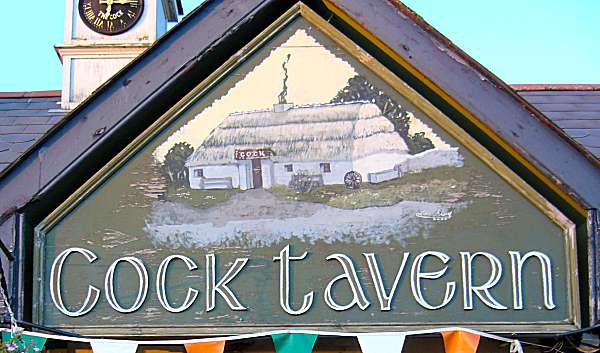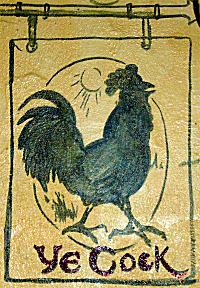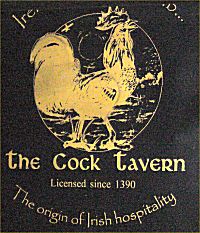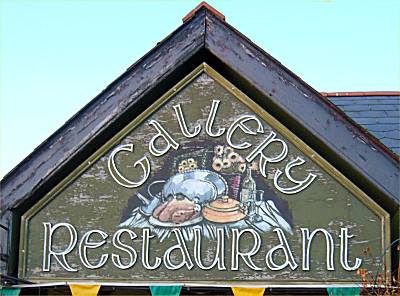
Much of the text on this page has been transcribed from a leaflet picked up in the pub itself during the Gormanston Beekeeping Summer School of 2007.
In a footnote to the leaflet is stated...
"Based on extensive and painstaking research of this project over many weeks, I am pleased to conclude that the present Cock Tavern stands on the site of an old medieval inn and that to the best of my knowledge, it has traded without interruption since the 1390s. It therefore ranks as one of Ireland's oldest premises - and to my mind indeed, the very oldest!"
Eamon Casey, Historian
Pelican Marketing Publications
The document is made available here in order that a wider audience can understand the significance of the Cock Tavern at Gormanston. Where many visitors have been made welcome over many centuries. The photographs were taken in order to mimic the black and white illustrations of the original leaflet. At the time of producing this page the encumbant hosts of the Cock Tavern were... Paul and Helen Doherty.
The Cock Tavern in Gormanston, possessing a most enviable licensed heritage ranks as one of Ireland's oldest licenced premises. And while there are many contemporaries that would claim antiquity, the Cock is fortunate in that clear historical evidence is available to substantiate the claim.
The significance of this claim is reliant upon three separate but yet related factors...
The importance of Drogheda as a wine importing port.
The patronage and protection of the De Preston family.
The importance of the great northern route which connected Dublin to Drogheda and eventually to Belfast.

It was through the fusion of these factors that the original Cock Tavern (or Ye Sign of Ye Cock) came into existence, which came about as follows...
Following the Norman invasion the Gaelic tribes were systematically disinherited and the extensive lands of this region fell into the possession of the Norman Roger De Preston. Some of the lands on high ground were leased to another Norman family, Symcok. From this was derived the place name Symcok's Hill which would later be corrupted to Cox's Hill or Cock Hill. By 1357 Roger De Preston's son, Robert, had extended his lands as far as Richardstown and Sarsfieldtown. In 1361 he was knighted in the field and became Lord High Chancellor of Ireland. About this time he also purchased Gormanston, which was derived from the Irish name Clann de Gormain (the Gorman family), and took the name Lord Gormanston as his ancestral title.
Besides being a military man, landowner and Lord High Chancellor, Robert De Preston was also a merchant at heart and saw the massive trading potential between Dublin and Drogheda, particularly in French wines. From the port of Drogheda he was sole importer of a number of select French wines, which he transported along the Great Northern route to Dublin, but this was difficult and an arduous terrain, subject to frequent attack from the disinherited Gaelic chieftains. Entire shipments of wine were sometimes lost. Clearly a staging post or depot was required in which the wines could be stored.
Through a combination of these factors Robert De Preston granted a lease in the 1390s that an inn could be erected on his lands at Gormanston. Conditional to this lease was a stipulation that his wine storage depot would be situated on the grounds of the premises. This in turn came under the protection of Lord Gormanston's garrison to whom the innkeeper was obliged to provide sustenance.
And so, one of Ireland's oldest inns, 'Ye sign of Ye Cock' came into existence in the 1390s. The inn took it's name from the traveller's sight of Cock Hill and not, according to modern day fallacy, from the pursuit of cock fighting.
Over the next couple of centuries there is no further historical mention of the inn until 1635 when the Cock Inn was licensed by Charles 1st who, in attempt to fund a treasury devastated by Spanish Wars, had the audacity to introduce licence fees for pubs.
The audacious Charles also believed that the King's power was derived from God and ruled without the English parliament for eleven years, a consequence of which brought a most unwelcome guest past the door of the Cock Inn in 1649... Oliver Cromwell. Being a puritan, it is unlikely that Cromwell would have sampled the libations of the Cock Inn, but his 8,000 men camped overnight on the grounds of Gormanston Manor, the occupants having sworn loyalty to Cromwell's parliamentarian cause, whereas in reality they belonged to the royalist side.
Over the next century an a half the Cock Inn was at the zenith of it's power as a coaching inn. Numerous coaches would, by twilight each evening, have caught sight of the inn where they would find warm fires, fine ales and wines as well as sustenance before retiring for the night in the many cosy rooms then encompassed in the old thatched inn. At the rear the old farriers and coaching yard echoed to the jingle of harnesses and the clatter of hoof beats where the animals were attended to, exchanged or rested overnight. The wine storage depot was then doing a thriving business and close by was a Turnpike Gate where travellers paid a toll.
It is also believed that this may very well have been the original location of Preston's whiskey distillery before transferring to it's more illustrious foundation in Drogheda. The inn was of paramount importance to travellers not merely as an overnight coaching stop, but more particularly, as a source of solace and shelter from the rampant bands of highwaymen who scoured the route after nightfall.

Some of the more daring like the exclusive Michael Collier who, uncommonly dedicated to his profession, often mingled among the noblemen and merchants in order to assemble information which would later assist him in the execution of his duties along dark and desolate roads. In pursuit of such unfortunate victims he was captured here by Lord Gormanston's garrison in November 1807 but managed to escape the gallows once more.
About this time the McCabe family were landlords of the inn, which would revert to the status of tavern in the late 19th century as faster roads, better means of transport and the dissipation of the scourge of highwaymen dictated that the days of the coaching inn were numbered. The wine storage depot had by now been replaced by a storage and stabling depot for McArdle's Brewery in Dundalk who were waging a relentless beer war against Arthur Guinness and Co. The McCabe family, discerning as well as enterprising publicans, hedged their bets and welcomed the first brew of Guinness to this region. For this endeavour they were rewarded with one of the first personalised bottling labels, an enlargement of which was presented to the Cock Tavern.
Today the Cock Tavern is adapting and meeting the demands of a new century. But down the years scarcely no other pub in the history of Irish pub lore has witnessed such diversity of heritage... The trading of the Normans, the ravages of Cromwell, the rebellion of 1798 and the destruction of the Black and Tans (1920), the great coach house days and the scourge of the highwaymen. Noblemen and scholars, priests on the run, seafarers and race goers, aristocrats and chancers, merchants and travellers, have all mingled freely within these hallowed walls.

The leaflet text ends here, but I can add that the Cock tavern has served the beekeeper attendees of the FIBKA Gormanston Summer School very well, even if on three occasions (2000, 2001, and 2007) they have run out of bottled Guinness. Some of these beekeepers have hailed from all over the world and no doubt the content of this web page will also be read all over the world, so the Cock Tavern is truly famous the world over.
Modern times bring eating more into play than just serving ale and wines and the Cock tavern caters for family meals or simple snacks in the gallery restaurant, which can be booked for private functions.
Outdoor Catering Functions can also be staged by the staff at the Cock Tavern.